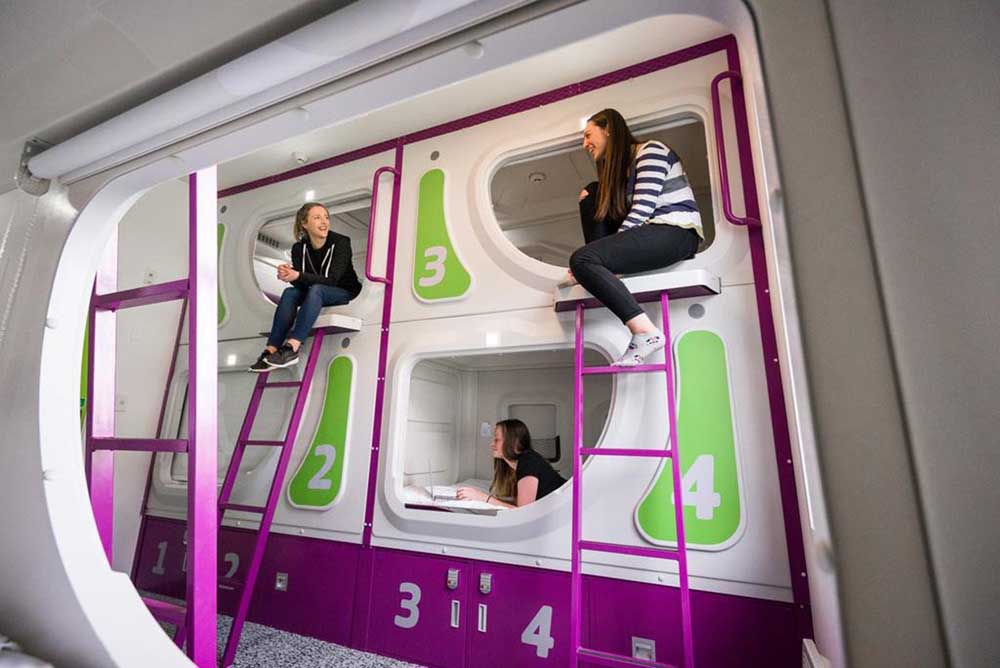Sleeping pods could revolutionize the cheap hotel experience
Published 12:00 am Sunday, May 19, 2019

- This sleeping pod setup is at the Jucy Snooze micro hotel in New Zealand. These are twin-size spaces; a recent proposal in San Diego calls for a slightly larger space to accommodate a queen-sized bed. (Courtesy of Stay Open/TNS)
SAN DIEGO — A proposal to build a novel micro hotel on Southern California’s Pacific Highway — one that would contain dozens of sleeping pods renting for $35 a night — has won the unanimous support of key policymakers here.
The San Diego Port Commissioners’ decision represents a pivotal step toward building a $10.6 million project proposed by Los Angeles-based Stay Open, a development team that has already built similar projects in New Zealand. Stay Open was competing with two other developers that had responded to a solicitation that the Port of San Diego launched earlier this year in hopes of getting low-cost accommodations built on just 3 acres.
“The demand for this, I think, will outstrip supply very quickly,” said Commissioner Marshall Merrifield. “The temptation will be to fill demand with higher prices. Resist that. Maybe there could be some kind of lottery or fair way of adjudicating that demand issue, or maybe we could do another hotel shortly after this.”
To stimulate interest in building an affordable hotel project, San Diego’s port authorities offered the inducement of a $6.3 million subsidy, most of which will come from fees previously paid by the developer of two hotels instead of providing low-cost lodging.
Up and down the state, such “in lieu” fees have been collected over the years from developers seeking to build along the coast, but so far, California has little to show in the way of affordable lodging constructed with the help of those revenues. Use of the fees has to be approved. If Stay Open were to get the OK to use the money, its contribution to the development cost would be roughly $4.3 million.
Stay Open is a collaboration of Jucy Snooze, a New Zealand company that has developed other pod-type motels, and Los Angeles-based CaRE Development, which has been involved in financing $750 million in U.S.-based hotels.
The winning submission calls for stackable 30-square-foot pods, plus six rooms with private baths that would go for an estimated $116 a night. The development team also is proposing a rooftop restaurant and lounge space for events that would be open to the public. Part of the Stay Open business model, said CEO and co-founder Steve Shpilsky, is incorporating food and beverage into the micro hotel experience.
Also important, he said, is making sure the dining and drinking options are marketed to the general public.
“Having affordable pods is one way to get people in the door,” Shpilsky said.
Some commissioners raised concerns about the potential for room or pod rates escalating too quickly. Shpilsky noted that any growth in rates would generally be tied to inflation.
As the project details get refined, Shpilsky said, Stay Open may explore using more of the second level of the project for additional larger rooms that might include a queen bed and a set of bunk beds, although the bathroom would still be shared.
Tuesday’s action by the commissioners follow a yearslong fight with the California Coastal Commission, a land use agency, over its insistence that the port do more to encourage lower-cost lodging. The commission has made it clear in recent years the state tidelands overseen by the port fall short when it comes to affordable accommodations.
And the sleeping pod project faces a long approval process, including environmental review and a hearing before the coastal commission. It could be as long as five years before the micro hotel opens.






